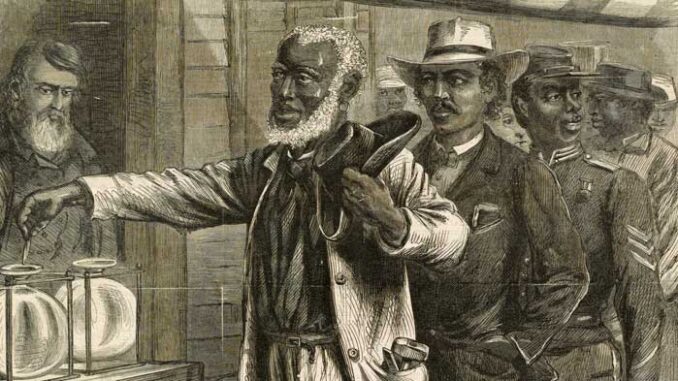
Data News Staff Report
We are again at a crucial point in the history of our nation, where raising our collective voices is not only important but necessary. So, it is important that we get out to the polls. In this part two of our series on elections we would like to take you through a brief journey through history as to why we must vote. The historical significance of Black people voting is multi-faceted, deeply rooted in struggles for civil rights and equity, and it plays a critical role in the shaping of democracies, particularly in the United States. Here are some of the significant aspects of this history:
1. The End of Slavery and Reconstruction (1865-1877):
- Following the Civil War, the 13th Amendment abolished slavery in 1865. Subsequent amendments—the 14th and 15th—granted citizenship to all born in the U.S. and forbade the denial of voting rights based on race, respectively.
- During Reconstruction, Black men (women did not have the right to vote until 1920) began participating in electoral politics, both as voters and as elected officials at local, state, and federal levels.
- However, by the late 1870s, the promise of Reconstruction was overturned by a combination of political, social, and economic forces, leading to the systematic disenfranchisement of Black voters.
2. Jim Crow Era and Disenfranchisement (Late 19th and Early 20th Century):
- After Reconstruction, Southern states implemented a series of laws, collectively known as Jim Crow laws, to disenfranchise Black voters through tactics such as poll taxes, literacy tests, and grandfather clauses.
- Violence, intimidation, and lynchings were also used as tools to suppress the Black vote.
3. Civil Rights Movement (1950s-1960s):3.
- The struggle to end segregation and ensure voting rights for Black citizens became a focal point of the Civil Rights Movement.
- Landmark events, such as the Selma to Montgomery marches and the murders of activists like Medgar Evers, highlighted the lengths to which opponents would go to deny Black people the right to vote.
- This activism culminated in the passage of the Voting Rights Act of 1965, which sought to eliminate racial discrimination in voting, especially in the South.
- 4. Political Power and Representation:
• The ability for Black people to vote enabled greater representation in political offices. This increased representation allowed for the promotion of policies that addressed racial inequalities and other issues pertinent to Black communities.5. Modern Challenges and Continued Activism:
• While the Voting Rights Act was pivotal, challenges to Black voting rights persist. Issues like gerrymandering, voter ID laws, and the closing of polling places in predominantly Black areas continue to present obstacles.
• The 2013 Supreme Court decision in Shelby County v. Holder significantly weakened the Voting Rights Act by removing key protections, leading to new efforts to restrict voting rights in several states.The right to vote is a cornerstone of democratic governance. When any group—based on race, gender, or other factors—is denied this right, it raises fundamental questions about the nature of that democracy. The struggle of Black people for the right to vote, and the forces arrayed against them, reflect broader societal tensions about race, power, and justice. The historical significance, therefore, is not just about the act of voting but about the broader quest for equality and dignity.
So, we are asking our readers to please get out and vote.
Recommended For You.




Be the first to comment